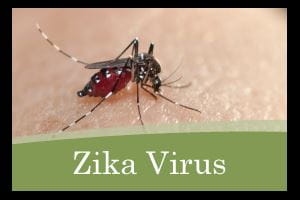Zika virus (Zika) is most commonly spread to people through mosquito bites. The mosquito that spreads Zika lives mostly in warm (tropical and subtropical) regions of the world and is not found in Colorado. Although a few Colorado residents contracted Zika while traveling, the risk of Zika spreading through mosquito bites in Colorado is very low. Denver Public Health and Denver Department of Public Health and Environment are working closely to monitor the spread of the disease, identify risks and plan for the possibility of a case in the metro area.
What are the symptoms of Zika?
About one in five people infected with Zika will get sick. For people who get sick, the illness is usually mild and goes away on its own. Symptoms typically begin two to seven days after being bitten by an infected mosquito. The most common symptoms of Zika are:
- Fever
- Rash
- Joint pain
- Conjunctivitis (red eyes)
How is Zika transmitted?
- Through the bite of infected Aedes mosquitoes.
- From a pregnant mother to her baby during pregnancy or around the time of birth. We do not know how often Zika is transmitted this way.
- Through sexual contact with a person infected with Zika. We do not know how often Zika is transmitted this way.
Who is most at risk?
- Anyone who is living in or traveling to an area where Zika is found and who has not already been infected with Zika is at risk for infection.
- Pregnant women area especially at risk for complications.
Are there additional considerations for women who are pregnant or are trying to become pregnant?
- Because of report of a serious birth defect of the brain call microcephaly (a condition in which a baby's head is smaller than expected when compared to babies of the same sex and age) in babies of mothers who were infected with Zika while pregnant, the Centers for Disease Control and Prevention (CDC) recommends pregnant women consider postponing travel to areas where the spread of Zika is occurring.
- Couples that are trying to become pregnant and recently traveled to areas where the spread of Zika is occurring should view the CDC recommendations on the back of our fact sheet.
What countries have Zika?
- Outbreaks of Zika have occurred in parts of Africa, Brazil, Central America, the Caribbean, Mexico, and Southeast Asia and it is expected to spread to other countries, including warm areas of the United States. A complete list of countries where Zika is found is available on the CDC website.
What should I do if I think I have Zika?
- See your healthcare provider if you develop symptoms (fever, rash, joint pain, red eyes). If you have recently traveled, tell your healthcare provider.
- If you are currently pregnant and think you may have had Zika at any point during your pregnancy or around the time your baby was conceived, contact your healthcare provider.
- Use condoms or abstain from sex to avoid spreading Zika to sexual partners. For more information about sexual transmission, view the CDC recommendations on the back of our fact sheet.
How is Zika treated?
While there are no medicines to treat Zika, you can treat symptoms by:
- Getting plenty of rest.
- Drinking fluids, like water to prevent dehydration.
- Taking over-the-counter medicines to relieve fever and pain.
- Do not take aspirin or other non-steroidal anti-inflammatory drugs (NSAIDs) until your provider is positive you do not have Dengue. Dengue symptoms are very similar to Zika and aspirin and NSAIDs can cause complications..
How can I prevent Zika?
- Apply insect repellents that are safe for skin and contain DEET when going outside in areas where Zika is found.
-
Read insect repellent instructions before applying on children. Insect repellent should not be used on babies younger than two months.
-
Use window and door screens to keep mosquitoes outside.
-
Use insect repellents containing permethrin on clothing, shoes, tents and other gear.
-
Cover baby carriers, cribs and strollers with mosquito netting.
-
Dress in clothing that covers your arms and legs.
-
If you have sex with someone known to have Zika, use safe sex practices, such as condoms to help prevent potential transmission.
-
Currently, no vaccines are available to prevent Zika
Should I protect my home from mosquitoes?
Although the type of mosquito that spreads Zika is not found in Colorado, you can protect yourself from other diseases spread by mosquitoes by:
- Emptying any containers, tires, birdbaths, gutters and buckets that have collected water. Mosquitoes breed in standing water.
- Installing screen doors and windows to keep mosquitoes from entering your home.
- Avoiding over-spray of turf and landscapes. This can result in creating long-term puddles in street gutters.
- Contacting the Denver Department of Public Health and Environment (by calling 3-1-1) if you need help with mosquito removal.
For more information or questions about Zika Virus, call Denver Public Health at 303-602-3614.
Sources:



